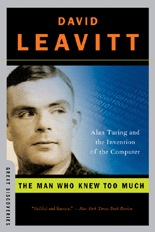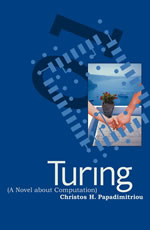

Bob Martin,
BiHall 635, ext 5923
Email: rmartin@middlebury.edu
Office hours: MWF 11:05-12:05, TuTh 3:00-4:00, and by
appointment
Michael Olinick, WNS 314, ext 5559
Email: molinick@middlebury.edu
Office hours: MWF 11:05-12:05, TuTh 3:00-4:00, and by
appointment
None.
MWF 11:15-12:05 in WNS
506/507, M 7:30-10:25 p.m. (video screenings) in WNS 202
The Man Who Knew Too Much: Alan Turing and the Invention of the
Computer, David Leavitt, W. W, Norton, 2006

The Code Book: The Evolution of Secrecy from Mary, Queen of Scots to
Quantum Cryptology, Simon Singh, Doubleday, 1999, ISBN 0-385-49531-5

Turing (A Novel about Computation), Christos Papadimitriou,The M.I.T.
Press, 2003, ISBN
0-262-16218-

David Leavitt's
Web
Page
Simon
Singh's Web page
Cristos
Papadimitriou's Web
Page
B. Jack
Copeland's Web page
Your final grade will be computed from four components:
exam1 (in class on Monday,
March 15), exam2 (in class
on Friday, April 23), a final exam
(on Tuesday May 11 from 9am - noon in BiHall 104), and homework. The components
will have the following weights:
exam1 - 20%
exam2 - 20%
homework - 20%
final - 40%
The work you submit must be the result of your own individual effort. You may discuss how to solve homework problems with other students but when it comes to the actual writing of programs or problem sets, your work must be your own. You must write your own solutions without having someone telling you what to write or copying the work of someone else. In particular, you should never have a copy of someone elses work in your possession, either electronically or on paper. It is also your own responsibility to protect your work from unauthorized access by others.
Exams and quizzes, of course, must be entirely your own work.